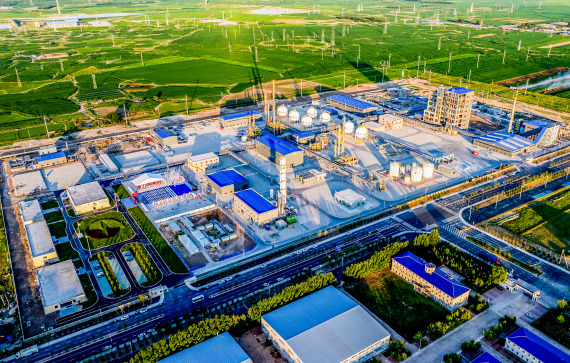Bio-Methanol: Sustainable Chemistry for a Greener Future
Bio-methanol is a renewable alternative to conventional methanol, produced from sustainable biomass sources rather than fossil fuels. As a key building block for numerous chemical products and a promising renewable fuel, bio-methanol represents an important pathway in the transition to a more sustainable chemical industry.
Unlike conventional methanol derived from natural gas or coal, bio-methanol is produced from renewable carbon sources such as agricultural waste, forestry residues, municipal solid waste, or captured carbon dioxide. This circular approach significantly reduces greenhouse gas emissions and dependence on fossil resources.
Transforming nature's waste into value: the bio-methanol production journey
From biomass to sustainable chemical building blocks, discover the innovative five-step process that converts agricultural and forestry residues into high-quality bio-methanol.
Bio-Methanol production
Bio-methanol is produced from renewable biomass sources, offering a sustainable alternative to fossil-based methanol through a sophisticated multi-stage process.

Biomass Preparation
Agricultural residues, forestry waste, or other biomass feedstocks are collected and prepared for processing.
Gasification
The biomass undergoes gasification, a thermal process that converts organic materials into synthesis gas (syngas) – a mixture primarily consisting of hydrogen, carbon monoxide, and carbon dioxide.
Gas Purification
The raw syngas contains various impurities that must be removed before further processing. This critical step ensures catalyst longevity and product quality.
Methanol Synthesis
Using specialized catalysts like Clariant's MegaMax series, the purified syngas is converted into methanol through a catalytic reaction process.
Distillation
The final step involves purifying the raw methanol to meet commercial specifications.
Gas Purification: Overcoming bio-methanol production barriers
Gas purification represents one of the most significant challenges in bio-methanol production. Unlike fossil-based feedstocks, biomass-derived syngas contains a complex mixture of contaminants that can poison catalysts, reduce efficiency, and compromise product quality.
Key challenges in gas purification include:
- Sulfur Compounds: Biomass typically contains various sulfur compounds that can deactivate catalysts downstream.
- Halides: Chlorides and other halides present in the syngas can cause corrosion and catalyst poisoning.
- Oxygen: Trace oxygen in the gas stream can reduce catalyst performance and lifespan.
- Particulates: Fine solid particles must be removed to prevent equipment fouling and catalyst deactivation.
- Tars and Heavy Hydrocarbons: These compounds can condense in downstream equipment, causing blockages and reduced efficiency.
Effective gas purification is essential for maintaining catalyst activity, ensuring process stability, and achieving high-quality bio-methanol production.
Clariant advanced gas purification catalysts and adsorbents
MegaMax: Superior catalyst technology for bio-methanol production
After effective gas purification, the methanol synthesis process requires specialized catalysts that can handle the unique challenges of bio-based feedstock, perfectly suited to excel in bio-methanol production environments.
Benefits
Enhanced Thermal Stability
The synthesis gas from biomass gasification is CO-rich, which creates a highly exothermic environment. Clariant´s expertise in Partial Oxidation (POX)-based applications, combined with over 50 years of experience in methanol synthesis catalysts, has led to the development of our high-performance MegaMax series. The catalysts have high thermal stability, ensuring consistent long-term performance under these challenging conditions.Superior Low-Temperature Activity
MegaMax catalysts offer outstanding activity even at very low reactor temperatures and pressures. This low-temperature performance is particularly valuable for bio-methanol production, where energy efficiency is crucial for economic and environmental sustainability.
Exceptional Selectivity
The catalyst's enhanced selectivity significantly reduces by-product formation, maximizing methanol yield and improving the economics of bio-methanol synthesis. This is particularly important when working with biomass-derived syngas, which can contain a wider variety of components than fossil-based feedstocks.
High Poison Tolerance
Building on 50 years of industry experience, MegaMax catalysts are engineered to withstand trace contaminants that may remain after gas purification, providing longer catalyst life and more reliable operation.
Lighthouse Project: Bio-Methanol plant Shanghai Electric in China
Clariant is proud to be at the forefront of the green methanol revolution, as demonstrated by our involvement in China's first commercialized biomass gasification-to-green methanol plant. This groundbreaking project showcases Clariant's commitment to sustainable chemistry and the energy transition.

Clariant MegaMax catalysts are successfully operating at Shanghai Electric´s biomass-to-green methanol plant in Taonan, Jilin Province, China.
The project is China´s first biomass to green methanol project and the first phase with a capacity of 50,000 tons/y of green methanol commenced successfully in July 2025.
The second phase of the project, with a capacity of 200,000 tons/y green methanol and 10,000 tons/y SAF, is expected to start production in 2027.The plant uses agricultural waste and green hydrogen from wind turbines to produce green methanol.
Powering the Green Revolution: Clariant's methanol technology for a sustainable future
Norbert Ringer, Clariant's Global Syngas Expert, as he reveals how green methanol is transforming sustainable transportation with zero or negative emissions potential. Learn the key differences between conventional and green methanol, and how industry leaders are building new value chains around these revolutionary fuels.
With over 50 years of catalyst expertise, Clariant's MegaMax™ 900 technology delivers higher activity, longer life, and reduced carbon footprint. See our real-world impact through partnerships like European Energy's green methanol project in Denmark.
Discover our next-generation MegaMax™ 900 DCARB catalyst for CO₂-to-methanol conversion—making truly GREEN maritime and aviation transport possible.

Comprehensive ACT Team Support: From Design to Operation
Clariant's Advanced Catalyst Technologies (ACT) team provides end-to-end support throughout the bio-methanol production journey.
Our experienced technical experts work closely with customers to ensure optimal catalyst performance and plant operation.
Performance prediction and process design
Our ACT team offers sophisticated performance prediction modeling to help customers optimize their process design for maximum efficiency. Using advanced simulation tools and drawing on extensive operational data, we can accurately forecast catalyst behavior under specific operating conditions, enabling informed decision-making during the planning phase.
Our technical experts use sophisticated modeling and simulation tools backed by extensive operational data to forecast catalyst behavior under specific conditions, optimizing process design for maximum efficiency.
On-site technical services
Clariant delivers more than just superior catalysts—we provide complete production support through:
- Expert Catalyst Loading: Our specialists ensure precise installation using proven techniques that maximize catalyst effectiveness and minimize pressure drop.
- Controlled Catalyst Reduction: Our team carefully monitors this crucial activation process to achieve optimal catalyst performance from the start.
- Start-up Monitoring: During this critical phase, our experts provide on-site guidance to ensure smooth operation and fine-tune parameters for peak performance.
Ongoing Technical Support
Throughout the catalyst lifecycle, our ACT team remains available for troubleshooting, performance optimization, and technical consultation.
Digital services
CLARITY Digital Platform: Our innovative tool transforms plant data into actionable insights at the click of a button, optimizing efficiency and profitability.


